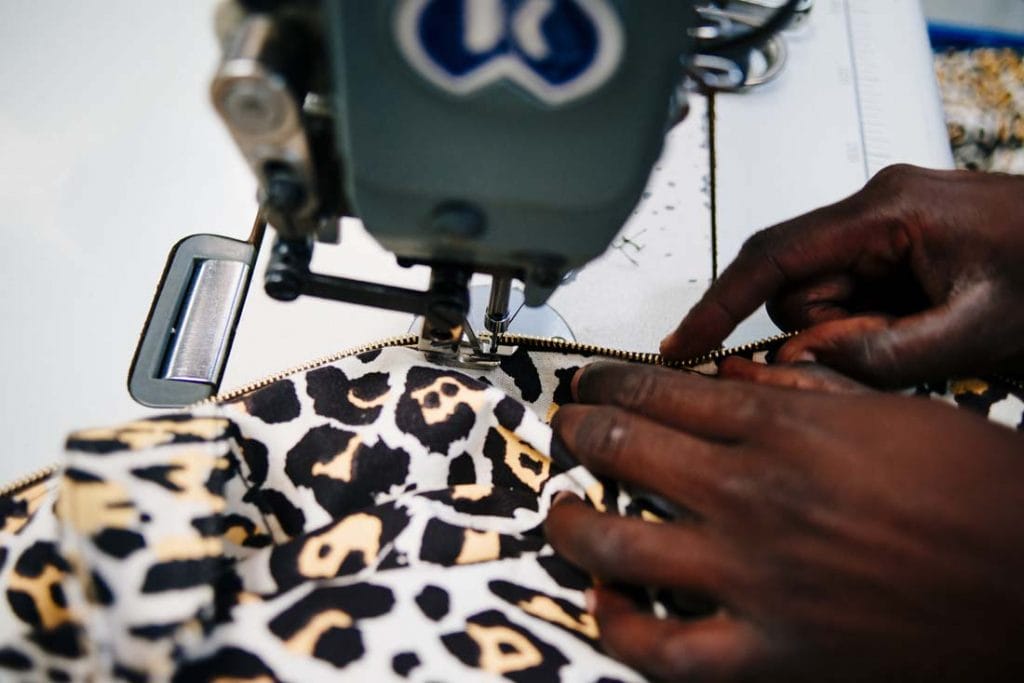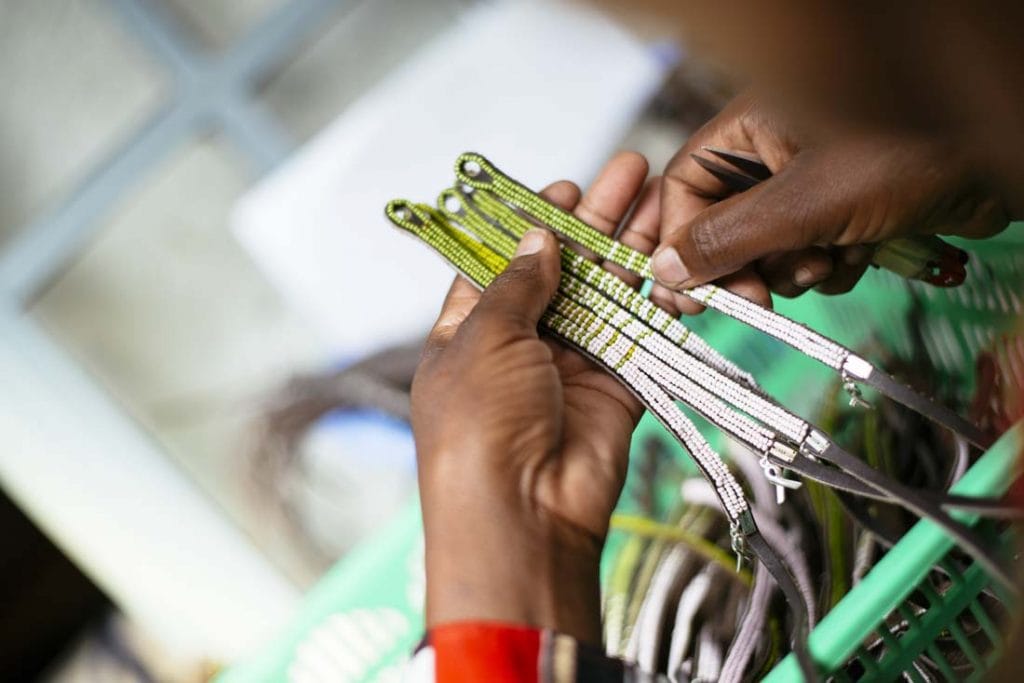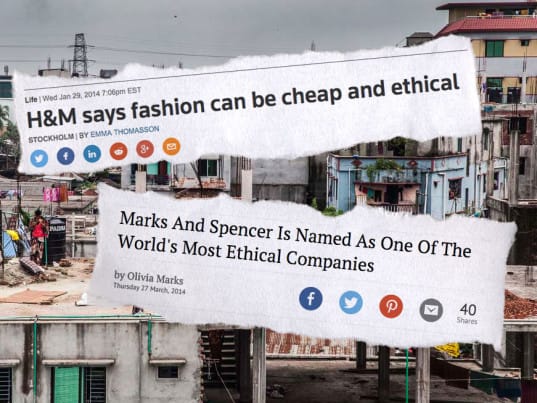In the recent years it has been discussed about the ethic aspect of the fashion business. Fashion is not only as shining page on the most famous magazines or the red carpet dresses worn by the actresses in the occasion of the glamorous events of movie or music system but also as one of the economic area involving billion of people.
Behind the superficiality and the fast changes, fashion is a cultural aspect of the human being.
The world of fashion has labeled eras, domination, kingdoms, empires and republics. People adopted external symbols to express personal behavior or ideas, sense of belongings or expression of disappointment.
Shapes, colors and materials have underlined the sense of the beauty and elegance but also created a way for a lot of people of surviving, or living, or increase their quality life and get profit.
Sometimes, walking on the main shopping area of the so called fashion cities, we forget that fashion industry is so wide and involving billion op people around the world.
When we buy a shirt, a pair of shoes or a bag we often don’t realize that behind the item are hundreds hour of hard working and people who care any aspects to let us satisfied.
The size of fashion business is bigger that we can suspect.
It is an industry that moves around 3 trillion of USD, 2% of the global GDP, considering apparels, shoes, bags, Make up, watches and jewelry.
- The womenswear industry is valued at 621 billion dollars
- The menswear industry is valued at 402 billion dollars
- The retail value of the luxury goods market is 339.4 billion dollars
- Children wear had a global retail value of 186 billion dollars
- Sports footwear is valued at 90.4 billion dollars
* The bridal wear industry is valued at 57 billion dollars
People working along the fashion chain are estimated be around 500 million around the world.
(Source: Eurostat 2014)
Statistics are just to show that a part the glamorous aspect, fashion is a huge business and for large part of the world it represents a clear source of income and a way to support their life.
Some countries of the world, mainly manufacturers countries, face social problems due the high competition that are compressing prices and some low cultural aspect about safety of the workers and hygienic conditions in which they live.
It is necessary also analyze these kind of problems not only under the light of our western culture but in the respect of the local tradition and the primary needs.
We on the western world, are condemning the use of young workers but it is also to be understood that for local culture more people are working and more the family has chance to survive. And more: without a job what those kids could do during the daytime? Involved in criminal activities, suffering violence and offence. What else?
Till the western world will not assume a full responsibility to increase the quality of life in those countries, it is un-useful to claim about these facts.
Workers that are not using protection in some place without and kind of primary facilities are close to a slave status. This is the reason why the big player and brand are so sensible to these aspects.
But it is just peanuts.
It is estimated that more than 15 million of young people are engaged in factory worker.
Here we report about some important activity of ethical fashion:
ECA: ETHICAL CLOTHING AUSTRALIA
The ECA voluntary accreditation program offers practical and affordable assistance to Australian businesses that are manufacturing locally. It ensures that their Australian supply chains are fully transparent and legally compliant.
The ECA program maps a company’s Australian supply chain throughout the entire cut, make and trim process, including all value adding processes. This is done via annual third-party compliance audits conducted by the Textile, Clothing and Footwear Union of Australia (TCFUA). By encouraging companies to view supply chain management as an integral part of business, ECA protects the rights of both local factory-based workers and outworkers.
http://ethicalclothingaustralia.org.au/
NORDIC INITIATIVE CLEANT & ETHIC (NICE)
NICE stands for Nordic Initiative Clean & Ethical, and NICE Fashion stands for Nordic Initiative Clean & Ethical Fashion. NICE is a project under the Nordic Fashion Association.
The Nordic Fashion Association was initiated in 2008, after Danish Fashion Institute, Oslo Fashion Week, The Swedish Fashion Council, Helsinki Design Week and Iceland's Fashion Council had met to cooperate with The Nordic Council of Ministers to launch Nordic Look during Riga Fashion Week.
This resulted in a unique collaboration. The five Nordic organizations quickly realized that they were each trying to get their respective industries to act more responsible and sustainable, and wanted to help struggling designers and textile companies to source in accordance with the Nordic innate values which reflect a need to protect the environment and a wish to behave fairly and just.
http://nordicfashionassociation.com/what-nice
ETHICAL CONSUMER
It is an association based in London that rates the ethics of companies, because in many cases a product or brand might be considered 'ethical' when the company that owns it is not. At the heart of our system is a company database, built up over 25 years from primary & secondary research and updated daily.
http://www.ethicalconsumer.org/ethical-company-ratings.aspx
FASHION REVOLUTION AND ETHCI CONSUMERS
After the disaster of the Rama Plaza in Bangladesh that in April 2013 killed thousands workers, the world of fashion took its responsibilities to give a fair guideline when a brand don’t own the production facility but use third party that are not easy to control.
“Clothing supply chains, according to Fashion Revolution, are notoriously complex, to the point of being opaque. Contrary to what you might expect, most fashion companies don’t own the factories where their clothes are produced, making it difficult to direct or monitor labor conditions. Complicating matters, a brand can place an order with a single supplier, only to have parts of it meted out among a number of small, unregulated “shadow” facilities, frequently without its knowledge.”
Transparency is a basic aspect in getting this world more ethic and this means regarding the relationship within brands and suppliers, suppliers against subcontractors, and brand to the consumers.
To find a solution or to start to a new policy, Fashion Revolution has created a Fashion Transparency Index, which ranks 40 leading apparel brands and retailers on their openness, communication, and accountability across their supply chains. “If you can’t see it, you don’t know it’s going on and you can’t fix it.”
The Fashion Transparency Index is assigning scores to the brands , based on some key factors as: policy, commitments, traceability of the supply chain, audit frequencies and the capacity to take actions when the standards are not met.
H&M, Levi Strauss, and Inditex, which owns Zara, are the companies that has realize the most efficient project of ethic fashion. In Zara website, anyone could see the suppliers in each part of the world and the informations are transparent and updated..
Traceability is one of the main issue about ethic fashion because it is not fully controlled the map of the sub contractors participating to any productive activity but technology is helping the organization and in a close future will be possible to answer to the question “WhoMadeThis?”



